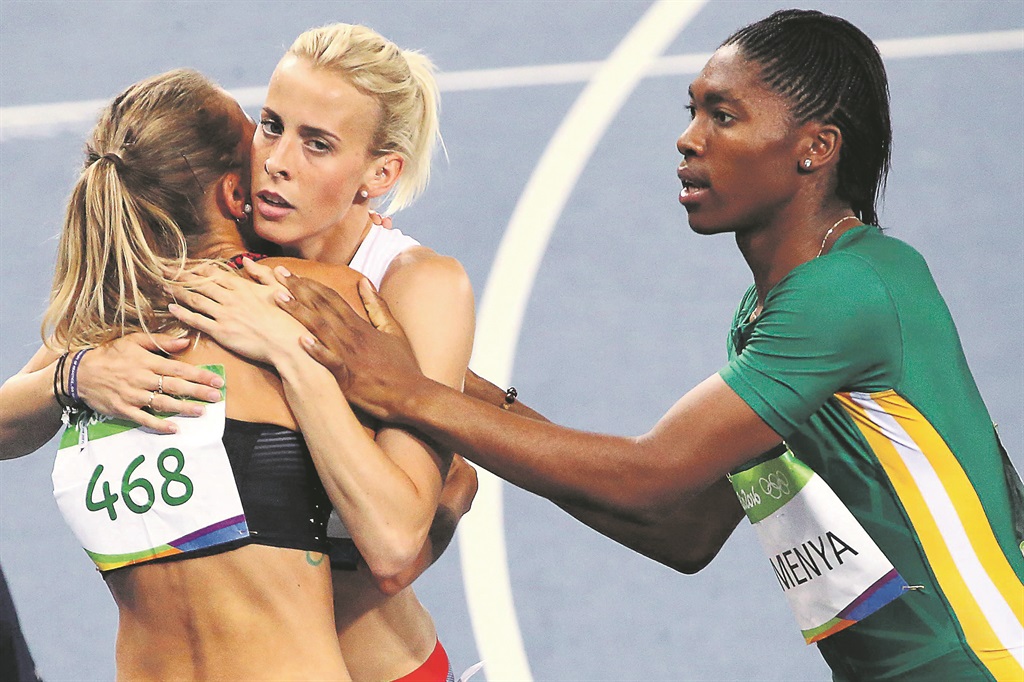
I want to think that Caster Semenya’s first act in the brief time she’s had at home this week was to collapse into her wife’s arms and weep.
I can’t think of a more logical reaction to the public flogging she’s experienced during the Rio Olympics, and she has shouldered this bullying since she was a teen.
It’s hard to imagine her falling apart, though. Nor can I see it of another great female athlete, Serena Williams.
We expect strength and grit from them, and grace and magnanimity.
Which was captured in that 800m final picture, where Semenya reaches out to the two failed finalists, Britain’s Lynsey Sharp and Canada’s Melissa Bishop.
If you are a die-hard believer in #BlackGirlMagic, you imagine that – when faced with brutalisation and public rejection – Semenya and Williams and other black female talents, in general, fart glitter in their haters’ faces (including racists and misogynists) before they flitter away unscathed.
There is an inhumanity in that expectation; the ceaseless demand for a well of goodwill that I find draining.
Yes, of course, I recognise the celebratory intentions in the tone of #BlackGirlMagic.
I fear, though, that the saying “Wathinta abafazi, wathinta imbokodo” (you strike a woman, you strike a rock) will soon imply that black women are unbreakable.
We expected Sharp and Bishop to fall apart.
In their impenetrable embrace and in Sharp’s gaze, they insisted on global witnesses to their misery, as if to shout: “We are the victims here.”
Then there were Sharp’s tears in her post-race interview.
Genuine and heartfelt though they were, they were telling of her level of entitlement for an athlete who finished sixth in an eight-woman race.
Many, including Olympic authorities, have obliged them their victim status, because they are the archetypal picture of feminine fragility.
In contrast to Semenya and Williams, they are the Western world’s ideal representation of womanhood, worthy of protection and our sympathy.
In the case for or against Semenya, experts claim they are using science to establish fairness, but, as it’s plain to see, this is about looks.
It’s about femininity and gender policing, says Jos Truitt in Feministing, and this has long been a part of women’s sport.
“It explains why we see so many amazing athletes getting massively femmed up and sexualised in advertising and the press,” says Jos.
A piece on female gymnastics by Megan Garber in The Atlantic finds that the more athletic the sport has become, the more hyperfeminine contestants have become.
To counteract the sight of girls with muscular thighs and bulky shoulders, the unladylike “leaping, grasping, thudding” gymnastics has adopted “pageant chic”, with sparkles and dramatic make-up and manicured fingernails and toenails.
Apparently the US gymnastics rulebook stipulates that athletes be “well-groomed in appearance”.
Lest we forget, the Olympics as an event is a Western and patriarchal institution.
It is built on sharp binaries of masculinity and femininity, among many things.
Women were not allowed to compete in the Olympics until 1900. And when they entered, it was to play lawn tennis and golf.
The Olympics have always been interesting for the political tensions; and with dissolving gender definitions and the increasing fluidity in sexuality, things are bound to escalate.
Follow me on Twitter @joonji




 Publications
Publications
 Partners
Partners








